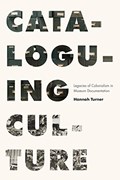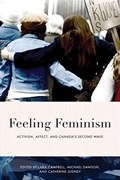Narrow Results By
Adjusting the lens : Indigenous activism, colonial legacies, and photographic heritage
https://archives.whyte.org/en/permalink/catalogue25525
- Medium
- Library - Book (including soft-cover and pamphlets)
- Published Date
- 2021
- Publisher
- Vancouver, British Columbia : University of British Columbia Press
- Call Number
- 07.2 L62a
- Responsibility
- Edited by Sigrid Lien and Hilde Wallem Nielssen
- Publisher
- Vancouver, British Columbia : University of British Columbia Press
- Published Date
- 2021
- Physical Description
- vi, 312 pages : illustrations (black & white) ; 24 cm
- Abstract
- Adjusting the Lens explores the role of photography in contemporary renegotiations of the past and in Indigenous art activism. In moving and powerful case studies, contributors analyze photographic practices and heritage related to Indigenous communities in Canada, Australia, Greenland, Norway, Sweden, Finland, and the United States. In the process, they call attention to how Indigenous people are using old photographs in new ways to empower themselves, revitalize community identity, and decolonize the colonial record. Adjusting the Lens presents original research in this emerging field in Indigenous photography studies, juxtaposing the historical and the contemporary across a range of geographically and culturally distinctive contexts. The transnational perspective of this exciting collection challenges old ways of thinking and meaningfully advances the crucially important project of reclamation. -- Provided by publisher
- Contents
- Reading a Regional Colonial Photographic Archive: Residential Schools in Southern Alberta, 1880-1974 / Carol Williams ; Camera Encounters: Bourgeois Settler Women's Adentures in Sami Areas of Norway / Sigrid Lien and Hilde Wallem Nielssen ; Negotiating Meaning: John Moller's Photographs in Early Twentieth-Century Scandinavian Literature / Ingeborg Hovik ; Reclaiming Pasts, Reclaiming Futures: Indigenous Re-workings of Historical Photography in North America / Laura Peers ; Distruption and Testimony: Archival Photographs, Project Naming, and Inuit Memory in Nunavut / Carol Payne, with contributions by Beth Greehorn, Piita Irniq, Manitok Thompson, Deborah Kigjugalik Webster, Sally Kate Webster, and Christina Williamson ; "Our Histories" in the Photographs of Others: Sami Approaches to Archival Visual Materials / Veli-Pekka Lehtola ; The Best Day for Me, Looking at These Old Photos: Returning Photographs to Australian Aboriginal and Torres Straight Islander People by Jane Lydon and Donna Oxenham ; On Being with (a Photograph of) Sugar Bush Womxn: Towards Anishinaabe Feminist Archival Research Methods / waaseyaa'sin Chrisitne Sy ; Indigenous Culture Jamming: Suohpanterror and the Art of Articulating a Sami Political Community by Laura Junka-Aikio ; Negotiating Postcolonial Identity: Photography as Archive, Collaborative Aesthetics, and Storytelling in Contemporary Greenland / Mette Sandbye ; Photographic Portraits as Dialogical Contact Zones: The Portrait Gallery of Sapmi - Becoming a Nation at the Arctic University Museum of Norway / Hanne Hammer Stein ; Photographic Studies and Indigenous Photographies: Some Thoughts on Categories, Assumptions, and Theories / Elizabeth Edwards
- ISBN
- 9780774866613
- Accession Number
- P2022.04
- Call Number
- 07.2 L62a
- Collection
- Archives Library
This material is presented as originally created; it may contain outdated cultural descriptions and
potentially offensive content.
Read more.
Ancestors : indigenous peoples of Western Canada in historic photographs
https://archives.whyte.org/en/permalink/catalogue25527
- Medium
- Library - Book (including soft-cover and pamphlets)
- Published Date
- 2021
- Publisher
- Edmonton, Alberta : University of Alberta Library
- Call Number
- 07.2 C24a
- 07.2 C24a copy 2
- Responsibility
- Edited by Sarah Carter and Inez Lightning
- Publisher
- Edmonton, Alberta : University of Alberta Library
- Published Date
- 2021
- Physical Description
- x, 188 pages : illustrations (some color) ; 23 x 24 cm
- Abstract
- This exhibition catalogue introduces historic photographs of Indigenous peoples of Western Canada from a collection housed at the University of Alberta's Bruce Peel Special Collections. The publication focuses on the ancestors represented in the collection and how their images continue to generate stories and meanings in the present. The selected photographs contribute to a richer, deeper understanding of the past. There is strength, character, persistence, determination, artwork, humour, dance, celebration, and so much more in the photographs. Some serve as records of cherished landscapes that may have been altered. Others provide links to ancestors: revered leaders, soldiers, healers, thinkers, and orators. The curators hope that the process of identifying the people in these photographs, only begun here, will continue. (Provided by Publisher)
- Contents
- Foreword / Chief Willie Littlechild ; The nature of the collection and its challenges ; Western Canada in the late Nineteenth and early Twentieth Centuries ; The aims of the curators ; The Exhibition
- ISBN
- 9781551954547
- Accession Number
- P2022.05
- Call Number
- 07.2 C24a
- 07.2 C24a copy 2
- Collection
- Archives Library
This material is presented as originally created; it may contain outdated cultural descriptions and
potentially offensive content.
Read more.
Authorized heritage : place, memory, and historic sites prairie Canada
https://archives.whyte.org/en/permalink/catalogue25510
- Medium
- Library - Book (including soft-cover and pamphlets)
- Published Date
- 2021
- Author
- Coutts, Robert
- Publisher
- Winnipeg, Manitoba : University of Manitoba Press
- Call Number
- 08.1 C83a
- Author
- Coutts, Robert
- Publisher
- Winnipeg, Manitoba : University of Manitoba Press
- Published Date
- 2021
- Physical Description
- 252 pages : illustrations, maps ; 23 cm
- Subjects
- Memory
- Heritage
- Historic sites
- Nationalism
- Colonialism
- Abstract
- Authorized Heritage analyses the history of commemoration at heritage sites across western Canada. Using extensive research in Parks Canada records, it argues that heritage narratives are almost always based on national and conventional messages that commonly reflect colonialist visions of the past. Throughout western Canada there are vivid examples of original and official views of what constitutes a national narrative. Yet many of the places that commemorate Indigenous, fur trade, and settler colonial histories are contested spaces, places such as Batoche, Seven Oaks, and Upper Fort Garry being the most obvious. At these heritage sites, Indigenous perceptions of the past confront the conventions of settler colonial history and denote the fluid cultural perspectives that must define the shifting ground of heritage space. Robert Coutts brings his many years of experience as a Parks Canada historian to this detailed examination of heritage sites across the prairies. He shows how the process of commemoration reflects social and cultural perspectives that privilege a confident and progressive national narrative. He also examines how class, gender, and sexuality often remain apart from the heritage discourse. Most notably, Authorized Heritage examines how governments became the mediators of what is heritage and, just as significantly, what is not. -- Provided by publisher
- Contents
- Landscapes of Memory in Prairie Canada ; Memory Hooks: Commemorating Indigenous Cultural Landscapes ; National Dreams: Commemorating the Fur Trade in Manitoba ; "We Came. We Toiled. God Blessed": Settler Colonialism and Constructing Authenticity ; Contested Space: Commemorating Indigenous Places of Resistance ; Heritage Place: The Function of Modernity, Gender, and Sexuality ; History, Memory, and the Heritage Discourse
- ISBN
- 9780887559266
- Accession Number
- P2022.02
- Call Number
- 08.1 C83a
- Collection
- Archives Library
This material is presented as originally created; it may contain outdated cultural descriptions and
potentially offensive content.
Read more.
Bead by bead : constitutional rights and Métis community
https://archives.whyte.org/en/permalink/catalogue25524
- Medium
- Library - Book (including soft-cover and pamphlets)
- Published Date
- 2021
- Publisher
- Vancouver, British Columbia : University of British Columbia Press
- Call Number
- 07.2 B71b
- Responsibility
- Edited by Yvonne Boyer and Larry Chartrand
- Publisher
- Vancouver, British Columbia : University of British Columbia Press
- Published Date
- 2021
- Physical Description
- xii, 221 pages ; 24 cm
- Subjects
- Indigenous
- Metis
- Canada
- Politics
- Colonialism
- Identity
- Abstract
- What does the phrase Me´tis peoples mean in constitutional terms? As lawyers and scholars dispute forms of Me´tis identity, and debate the nature and scope of Me´tis rights under the Canadian Constitution, understanding Me´tis experience of colonization is fundamental to achieving reconciliation. In Bead by Bead, contributors address the historical denial - at both federal and provincial levels - of outstanding Me´tis concerns and Aboriginal rights claims, in particular with respect to land, resources, and governance. Tackling such themes as ongoing colonial policies, the invisibility of Me´tis women in court decisions, identity politics, and racist legal principles, they uncover the troubling issues that plague Me´tis aspirations for a just future. This nuanced analysis of the parameters that current Indigenous legal doctrines place around Me´tis rights discourse moves beyond a one-size-fits-all definition of Me´tis or a uniform approach to Aboriginal rights. By raising critical questions about self-determination, colonization, kinship, land, and other essential aspects of Me´tis lived reality, these clear-eyed essays go beyond legal theorizing and create pathways to respectful, inclusive Me´tis-Canadian constitutional relationships. (Provided by Publisher)
- Contents
- Me´tis identity captured by law: struggles over use of the category Me´tis in Canadian law / Se´bastien Grammond ; Recognition and reconciliation: recent developments in Me´tis rights law / Thomas Isaac ; Shifting the status quo: the duty to consult and the Me´tis of British Columbia / Christopher Gall and Brodie Douglas ; The resilience of Me´tis title: rejecting assumptions of extinguishment / Karen Drake and Adam Gaudry ; Where are the women? Analyzing the three Me´tis Supreme Court of Canada decisions / Brenda L. Gunn ; Manitoba Me´tis Federation and Daniels: "post-legal" reconciliation and Western Me´tis / Jeremy Patzer ; Colonial ideologies: the denial of Me´tis political identity in Canadian law / D'Arcy Vermette ; Me´tis Aboriginal rights: four legal doctrines / Darren O'Toole ; Suzerainty, sovereignty, jurisdiction: the future of Me´tis ways / Signa A. Daum Shanks.
- ISBN
- 9780774865975
- Accession Number
- P2022.04
- Call Number
- 07.2 B71b
- Collection
- Archives Library
This material is presented as originally created; it may contain outdated cultural descriptions and
potentially offensive content.
Read more.
Blood memory : the tragic decline and improbable resurrection of the American Buffalo
https://archives.whyte.org/en/permalink/catalogue26204
- Medium
- Library - Book (including soft-cover and pamphlets)
- Published Date
- 2023
- Author
- Duncan, Dayton and Burns, Ken
- Publisher
- New York : Alfred A. Knopf
- Call Number
- 08 D91b
- Publisher
- New York : Alfred A. Knopf
- Published Date
- 2023
- Physical Description
- xvi, 329 pages : illustrations (chiefly color) ; 24 cm
- Subjects
- Buffalo
- Pablo-Allard buffalo round-up
- Conservation
- Indigenous
- Colonialism
- Environment
- Ecology
- Abstract
- The epic story of the buffalo in America, from prehistoric times to today--a moving and beautifully illustrated work of natural history. The American buffalo--our nation's official mammal-is an improbable, shaggy beast that has found itself at the center of many of our most mythic and sometimes heartbreaking tales. The largest land animals in the Western Hemisphere, they are survivors of a mass extinction that erased ancient species that were even larger. For nearly 10,000 years, they evolved alongside Native people who weaved them into every aspect of daily life; relied on them for food, clothing, and shelter; and revered them as equals. Newcomers to the continent found the buffalo fascinating at first, but in time they came to consider them a hindrance to a young nation's expansion. And in the space of only a decade they were slaughtered by the millions for their hides, with their carcasses left to rot on the prairies. Then, teetering on the brink of disappearing from the face of the earth, they would be rescued by a motley collection of Americans, each of them driven by different--and sometimes competing--impulses. This is the rich and complicated story of a young republic's heedless rush to conquer a continent, but also of the dawn of the conservation era--a story of America at its very best and worst -- Provided by publisher.
- Contents
- Part 1: The Trail to Extinction -- The Buffalo and the People -- Strangers -- Omen in the Skies -- The Iron Horse -- Kills Tomorrow -- Part 2: Back From the Brink -- A Death Wind for My People -- Just in the Nick of Time -- Changes of Heart -- Ghosts -- The Last Refuge -- Blood Memory -- Big Medicine.
- Notes
- Dayton Duncan ; based on a documentary film by Ken Burns ; written by Dayton Duncan ; with an introduction by Ken Burns ; picture research by Emily Mosher and Susan Shumaker ; design by Maggie Hinders.
- Whyte Museum archival collections utilized.
- ISBN
- 9780593537343
- Accession Number
- P2023.25
- Call Number
- 08 D91b
- Collection
- Archives Library
This material is presented as originally created; it may contain outdated cultural descriptions and
potentially offensive content.
Read more.
Brotherhood to nationhood : George Manuel and the making of the modern indian movement
https://archives.whyte.org/en/permalink/catalogue25528
- Medium
- Library - Book (including soft-cover and pamphlets)
- Published Date
- 2020
- Author
- McFarlane, Peter and Manuel, Doreen
- Publisher
- Toronto : Between the Lines
- Call Number
- 07.2 M16a
- Publisher
- Toronto : Between the Lines
- Published Date
- 2020
- Physical Description
- xxvi, 311 pages : illustrations ; 23 cm
- Subjects
- Indigenous
- History
- History-Canada
- Colonialism
- Politics
- Abstract
- George Manuel was the strategist and visionary behind the modern Indigenous movement in Canada. A three-time Nobel Peace Prize nominee, he laid the groundwork for what would become the Assembly of First Nations and was the founding president of the World Council of Indigenous Peoples. Authors Peter McFarlane and Doreen Manuel follow him on a riveting journey from his childhood on a Shuswap reserve through three decades of fierce and dedicated activism. In these pages, an all-new foreword by celebrated Mi'kmaq lawyer and activist Pam Palmater is joined by an afterword from Manuel's granddaughter, land defender Kanahus Manuel. This edition features new photos and previously untold stories of the pivotal roles that the women of the Manuel family played--and continue to play--in the battle for Indigenous rights.
- ISBN
- 9781771135108
- Accession Number
- P2021.02
- Call Number
- 07.2 M16a
- Collection
- Archives Library
This material is presented as originally created; it may contain outdated cultural descriptions and
potentially offensive content.
Read more.
Canada's place names and how to change them
https://archives.whyte.org/en/permalink/catalogue25683
- Medium
- Library - Book (including soft-cover and pamphlets)
- Published Date
- 2022
- Author
- Beck, Lauren
- Publisher
- Montreal, Quebec : Concordia University Press
- Call Number
- 02.1 B39c
- Author
- Beck, Lauren
- Publisher
- Montreal, Quebec : Concordia University Press
- Published Date
- 2022
- Physical Description
- ix, 251 pages ; 21 cm
- Abstract
- The first book to demonstrate how inadequately place names and visual emblems represent the presence of women, people of colour, and people living with disabilities, Canada’s Place Names and How to Change Them provides an illuminating overview of where these names came from and what they reflect. This book disentangles the distinct cultural, religious, and historical naming practices and visual emblems in Canada’s First Nations, provinces, territories, municipalities, and federal lands. Starting with a discussion of Indigenous place knowledge and naming practices from several Indigenous and Inuit groups spanning the country, it foregrounds the breadth of possible ways to name places. Lauren Beck then illustrates the naming practices introduced by Europeans and how they misunderstood, mis-rendered, and appropriated Indigenous place names, while scrutinizing the histories of Columbian names, missionary names, and the secular and commemorative names of the last two centuries. She studies key symbols and emblems such as maps, flags, and coats of arms as visual equivalents of place names to show whose identities powerfully inform Canada’s place nomenclature. This book also documents the policies and authorities that have traditionally governed the creation and modification of names and examines case studies of institutions and communities who have changed their names to demonstrate pathways to change.-- Provided by publisher.
- Contents
- Knowing in Place -- A Brief History of Settler-Colonial Naming Practices in Canada -- Gender and Canada’s Place Names -- Indigenous Names in a Settler-Colonial Context -- Marginalized Groups and Canada’s Place Names -- How to Discuss and Change Names.
- ISBN
- 9781988111391
- Accession Number
- P2023.01
- Call Number
- 02.1 B39c
- Location
- Reading Room
- Collection
- Archives Library
This material is presented as originally created; it may contain outdated cultural descriptions and
potentially offensive content.
Read more.
Cataloguing culture : legacies of colonialism in museum documentation
https://archives.whyte.org/en/permalink/catalogue25523
- Medium
- Library - Book (including soft-cover and pamphlets)
- Published Date
- 2022
- Author
- Turner, Hannah
- Publisher
- Vancouver, British Columbia : University of British Columbia
- Call Number
- 00 T85c
- Author
- Turner, Hannah
- Publisher
- Vancouver, British Columbia : University of British Columbia
- Published Date
- 2022
- Physical Description
- xiii, 243 pages : illustrations ; 24 cm
- Subjects
- Museums
- Cataloguing
- Colonialism
- Inclusion
- Abstract
- How does material culture become data? Why does this matter, and for whom? As the cultures of Indigenous peoples in North America were mined for scientific knowledge, years of organizing, classifying, and cataloguing--hardened into accepted categories, naming conventions, and tribal affiliations --much of it wrong. Cataloguing Culture examines how colonialism operates in museum bureaucracies. Using the Smithsonian's National Museum of Natural History as her reference, Hannah Turner organizes her study by the technologies framing museum work over 200 years: field records, the ledger, the card catalogue, the punch card, and eventually the database. She examines how categories were applied to ethnographic material culture and became routine throughout federal collecting institutions. As Indigenous communities encounter the documentary traces of imperialism while attempting to reclaim what is theirs, this timely work shines a light on access to and return of cultural heritage. -- Provided by publishe
- Contents
- Introduction: "The Making of Specimens Eloquent" ; Writing Desiderata: Defining Evidence in the Field ; On the Margins: Paper Systems of Classification ; Ordering Devices and Indian Files: Cataloguing Ethnographic Specimens ; Pragmatic Classification: The Routine Work of Description after 1950 ; Object, Specimen, Data: Computerization and the Legacy of Dirty Data ; Conclusion: A Museum Data Legacy for the Future
- ISBN
- 9780774863933
- Accession Number
- P2022.04
- Call Number
- 00 T85c
- Collection
- Archives Library
This material is presented as originally created; it may contain outdated cultural descriptions and
potentially offensive content.
Read more.
Echo loba, loba echo : of wisdom, wolves and women
https://archives.whyte.org/en/permalink/catalogue26217
- Medium
- Library - Book (including soft-cover and pamphlets)
- Published Date
- 2023
- Author
- Swift, Sonja
- Publisher
- Victoria, BC : Rocky Mountain Books
- Call Number
- 04 S5e
- Author
- Swift, Sonja
- Responsibility
- Foreword by Winona LaDuke
- Publisher
- Victoria, BC : Rocky Mountain Books
- Published Date
- 2023
- Physical Description
- 248 pages ; 20 cm
- Subjects
- Wolves
- Wildlife
- Conservation
- Women
- Abstract
- A unique look at the cultural, environmental, historical, literary, metaphorical, and political role of the wolf. Echo Loba, Loba Echo is a story about the metaphor of the wolf and how this is echoed in the lives and minds of people. A metaphor that embodies worldviews colliding, and the collision, the fallout, we live with still. It is a story about wolves’ own cultures, survival stories, acts of rebellion, and vital roles in maintaining healthy territories. And it is also a story about what we have been told to forget, or never even know, and what wolves show us about ourselves. Through essay and poetry, the metaphor of the wolf, and loba – for she-wolf – is examined the way one might observe the light off a prism, in multi-dimensional ways. The associations are many and diametrically varied. Wolf as scapegoat, villain, outcast, blamed for human violence. Wolf as warrior, guide, mother to stray or orphaned children as well as her own pups. The Ojibwe word for wolf is ma’iingan: the one sent here by that all-loving spirit to show us the way. Wolf (Latin: lupus), which is another word for whore (lupa), for woman. Wolf, another word for backcountry. Yet the choice is not an easy duality, not simply between the notion of wolf as heroine or wolf as devil. -- From publisher
- ISBN
- 9781771606288
- Accession Number
- P2024.01
- Call Number
- 04 S5e
- Collection
- Archives Library
This material is presented as originally created; it may contain outdated cultural descriptions and
potentially offensive content.
Read more.
Feeling feminism : activism, affect, and Canada's second wave
https://archives.whyte.org/en/permalink/catalogue25720
- Medium
- Library - Book (including soft-cover and pamphlets)
- Published Date
- 2022
- Publisher
- Vancouver, BC : UBC Press
- Call Number
- 08.1 C15f
- Responsibility
- Edited by Lara Campbell, Michael Dawson, and Catherine Gidney
- Publisher
- Vancouver, BC : UBC Press
- Published Date
- 2022
- Physical Description
- viii, 324 pages : illustrations ; 24 cm
- Subjects
- Feminism
- Women
- Human rights
- Activism
- Politics
- Abstract
- Feeling Feminism examines the ways in which emotions such as anger, rage, joy, and hopefulness influenced second-wave feminist theorizing and action across Canada. From beauty pageant protests to fire bombings of pornographic stores, emotions are a powerful but often unexamined force in the actions underlying feminist history. They are at play in the experiences of injustice, exclusion, caring, and suffering that have fed women's commitment to building and sustaining a new world. The movement was at its height from the mid-1960s to the early 1980s, but this groundbreaking study embraces the perspective of a long second wave, reaching back to the 1950s and forward into the early 1990s. Drawing explicitly on the history of emotions and affect theory to convey the passion, the sense of possibility, and the energizing collective political commitment that has characterized feminism, contributors reveal its full impact on contemporary Canada and highlight the contested, sometimes exclusionary nature of the movement itself. Insights from gender and women's studies, cultural and literary theory, social psychology, and sociology infuse Feeling Feminism, as the contributors explore how emotions shaped and nourished feminist activism. More generally, they demonstrate the power of emotions, desires, and actions to transform the world. -- Provided by publisher.
- Contents
- Introduction: Second-Wave Feminism and the History of Emotions / Lara Campbell, Michael Dawson, and Catherine Gidney -- Pride, Shame, and Anger: Women's Struggles to Achieve Natural Childbirth in Postwar Canada / Whitney Wood -- Good Mother of Science: Emotional Letters to Frances Oldham Kelsey during the Thalidomide Crisis / Cheryl Krasnick Warsh -- Therapeutic Political Spaces: Collective Resistance among Indigenous Women in British Columbia / Sarah A. Nickel -- "Feeling My Way": Women's Community Activism in the Company of Young Canadians / Kevin Brushett -- Tears and Tiaras: Affect, Beauty Pageants, and Protests / Patrizia Gentile -- "Jesus is not part of this collective": Secular Passions and Religious Alienation among the Sisterhood / Lynne Marks, Margaret Little, Marin Beck, Emma Paszat, and Taylor Antoniazzi -- Intense Times: Love, Fear, and Pride as Guides to Lesbian Feminist Organizing / Liz Millward -- Resisting Red Hot Video: Feminisn, Pornography, and the Political Utility of Emotion / Eryk Martin -- An Assumption of Shared Fear: Feminism, Sex Work, and the Sex Wars in 1980s Kinesis / Emma McKenna -- Emotional Scripts of Difference: Black Women Teachers and Feminist Mobilization / Funke Aladejebi -- "Briser le mur du silence": Emotions, Gender, and the 1981 Women Journalists' Conference in Quebec / Josette Brun, Laurie Laplanche, and Sophie Doucet -- Anger, Melancholia, and Hope: The Feminist Politics of Emotion and the Centre for Women and Trans People at Wilfrid Laurier University / Matthew Fesnak.
- ISBN
- 9780774866514
- Accession Number
- P2023.11
- Call Number
- 08.1 C15f
- Location
- Reading Room
- Collection
- Archives Library
This material is presented as originally created; it may contain outdated cultural descriptions and
potentially offensive content.
Read more.










